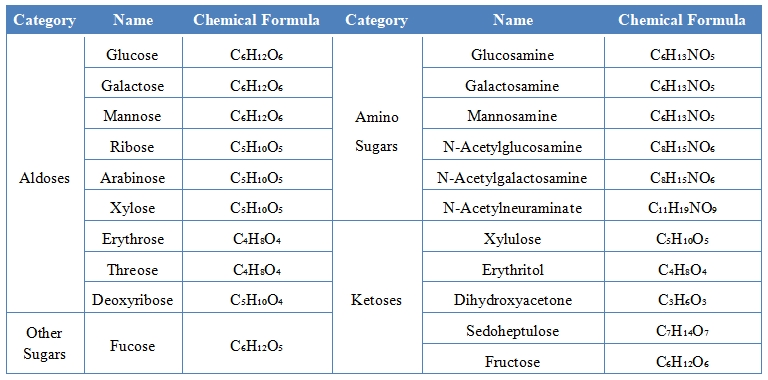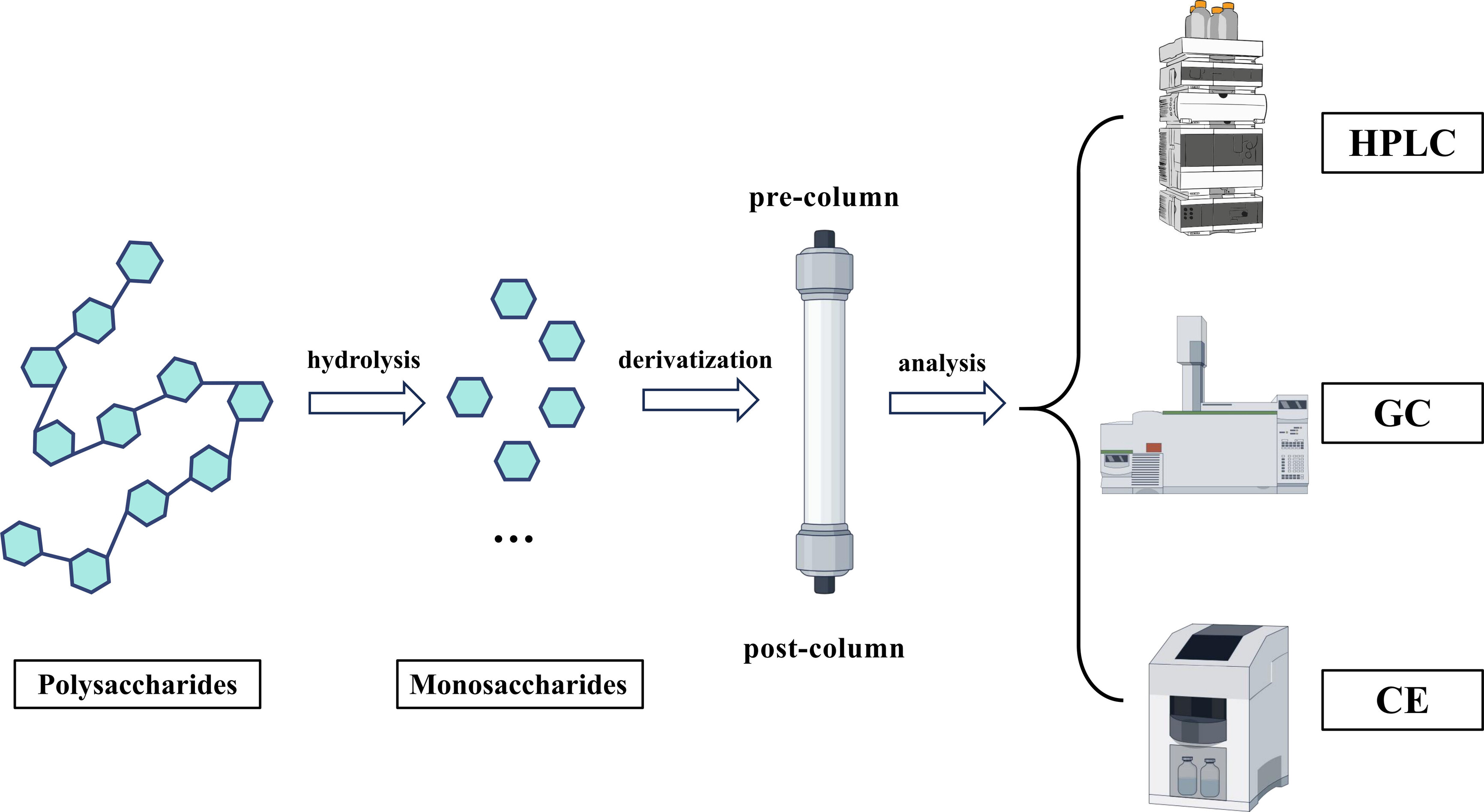Monosaccharide Composition Analysis Services
Monosaccharides are the basic units of carbohydrates, including various types such as glucose, fructose, and galactose. They are the fundamental building blocks of complex glycan chains and carbohydrate molecules, such as glycoproteins and glycolipids. Using advanced technologies such as high-performance liquid chromatography (HPLC), mass spectrometry (MS), and capillary electrophoresis (CE), this service enables the separation and quantification of monosaccharide components in samples and provides detailed compositional analysis. This service is of great significance for carbohydrate research, helping researchers accurately reveal glycan structural information and laying the foundation for downstream functional studies and disease mechanism exploration.
The monosaccharide composition analysis services are widely applied in multiple fields. In glycomics research, it helps identify the monosaccharide composition of glycan chains and supports functional studies of glycosylation modifications. In the food industry, it is commonly used to analyze carbohydrate components in food products, ensuring product quality and safety. In the biopharmaceutical field, it is used for monosaccharide analysis of biological macromolecules such as glycoproteins and glycolipids, contributing to drug development, biomarker screening, and vaccine research.
Services at MtoZ Biolabs
Using advanced technologies such as high-performance liquid chromatography (HPLC), mass spectrometry (MS), and capillary electrophoresis (CE), the monosaccharide composition analysis services offered by MtoZ Biolabs provides high-precision analysis of monosaccharide composition. This service is applicable to a wide range of samples and enables quantitative analysis of the types and contents of monosaccharides within a sample. By separating different monosaccharide components and applying standardized analytical methods, the service delivers accurate quantitative data to help researchers uncover the carbohydrate composition of their samples. The analysis results can be used for glycan structure identification, functional studies, and investigations of glycosylation patterns. This service is widely applied in glycomics, food quality control, and biopharmaceutical research. The monosaccharides detectable by MtoZ Biolabs include, but are not limited to, the following categories:

Analysis Workflow
1. Sample Preparation
Samples are first pretreated to remove impurities, ensuring that the monosaccharide components are not affected by interfering substances.
2. Monosaccharide Release
Enzymatic digestion or chemical methods (such as acid hydrolysis) are used to release monosaccharides from glycan chains, enabling the efficient breakdown of complex sugar structures.
3. Separation and Purification
Released monosaccharides are separated using techniques such as high-performance liquid chromatography (HPLC) or capillary electrophoresis (CE), ensuring thorough separation and purification of individual components.
4. Quantification and Analysis
Quantitative analysis of monosaccharide types and concentrations is performed using mass spectrometry (MS) or HPLC in combination with standard curves, providing accurate composition data.
5. Data Interpretation and Reporting
The analytical results are interpreted in detail, and a final report is generated that includes quantitative monosaccharide composition data and related conclusions.

Chen, X X. et al. Chemistry & Biodiversity, 2024.
Figure 1. The Analysis Workflow of Monosaccharide Composition.
Service Advantages
1. High-Precision Analysis
Advanced analytical technologies are used to ensure accurate and reliable qualitative and quantitative analysis of monosaccharide composition.
2. High Sensitivity
Capable of detecting low-abundance monosaccharides, the service delivers sensitive results suitable for glycan analysis in complex biological samples.
3. Standardized Workflow
An optimized, standardized analytical workflow and state-of-the-art instrumentation ensure efficient data acquisition and fast turnaround for clients.
4. Customized Solutions
Tailored analysis strategies are provided based on clients’ research objectives and sample characteristics, offering flexible support for diverse research needs.
Applications
1. Omics Research
The monosaccharide composition analysis services can be used to analyze the monosaccharide composition in different biological samples, helping to reveal the role of glycosylation modifications in biological processes such as cell recognition and signal transduction.
2. Biopharmaceutical Quality Control
During the production of biopharmaceuticals such as glycoproteins and glycolipids, this service monitors the quality of carbohydrate components to ensure the consistency, stability, and safety of the products.
3. Food and Nutrition Research
The monosaccharide composition analysis services are used for analyzing carbohydrate components in food, ensuring the standardization and safety of food ingredients, and supporting the development and quality assessment of functional foods and nutritional products.
4. Plant and Agricultural Research
By analyzing the carbohydrate composition in plants or agricultural products, this service helps understand the metabolic pathways of plant carbohydrates and their role in plant growth and development, supporting agricultural research and crop improvement.
FAQ
Q1: Will the Analysis Process Affect the Carbohydrate Composition of the Sample?
A1: We employ gentle processing methods to ensure that the natural carbohydrate components of the sample are preserved as much as possible during sample preparation and glycan separation. All analytical steps are optimized to minimize any potential damage or loss of carbohydrate components, ensuring accurate analysis results.
Q2: How Is the Accuracy of the Analysis Results Ensured?
A2: To ensure the accuracy of the results, we use validated, standardized methods and high-resolution instrumentation platforms, such as high-performance liquid chromatography (HPLC) and mass spectrometry (MS). Additionally, each experiment follows a strict quality control process, from sample preparation to data analysis, to guarantee high precision and reproducibility of the analysis results.
Deliverables
1. Comprehensive Experimental Details
2. Materials, Instruments, and Methods
3. Monosaccharide Composition Report
4. Quantitative Analysis Data
5. Bioinformatics Analysis
6. Raw Data Files
MtoZ Biolabs, an integrated chromatography and mass spectrometry (MS) services provider.
Related Services
Monosaccharide Analysis Service
Monosaccharide Metabolism Analysis Service
How to order?







